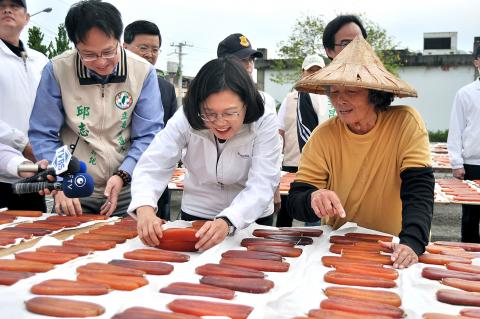Democratic Progressive Party (DPP) Chairperson Tsai Ing-wen (蔡英文) has taken a small lead over President Ma Ying-jeou (馬英九) in the presidential election campaign, a poll released by Taiwan Thinktank yesterday showed.
According to the poll, Tsai had 35.9 percent support against Ma’s 35.4 percent, while support for People First Party Chairman James Soong (宋楚瑜) was at 10.8 percent, the poll showed.
Compared with a previous poll conducted by the group earlier this month, support for both Ma and Tsai dropped about 3 percent.

Photo: Su Fu-nan, Taipei Times
Former DPP legislator Julian Kuo (郭正亮) said the result showed that recent incidents and disputes, from the price of persimmons to the first presidential debate last Saturday to controversy surrounding DPP vice presidential candidate Su Jia-chuan’s (蘇嘉全) wife, Hung Heng-chu (洪恆珠), for attending at a party 10 years ago that featured a male strip show, did not benefit any candidate.
Instead, the incidents added uncertainty to the election, Kuo said, as the percentage of undecided voters increased from 10 to 17.9 percent.
On growing youth unemployment, 76.9 percent of respondents said that it was a serious issue that needed to be addressed promptly, while 65.8 percent said forced unpaid leave among private businesses was also a serious matter.
“The poll showed that the unemployment rate among young people and unpaid leave are serious issues for voters regardless of party preferences, and presidential candidates should focus more on addressing the issues,” Hsu Yung-ming (徐永明), a political scientist at Soochow University, said at a press conference held to release the poll results.
Liu Chin-hsin (劉進興), a retired professor at National Taiwan University of Science and Technology, said income and employment are two key economic elements, and the presidential candidates should address those issues because they concern the public the most.

The manufacture of the remaining 28 M1A2T Abrams tanks Taiwan purchased from the US has recently been completed, and they are expected to be delivered within the next one to two months, a source said yesterday. The Ministry of National Defense is arranging cargo ships to transport the tanks to Taiwan as soon as possible, said the source, who is familiar with the matter. The estimated arrival time ranges from late this month to early next month, the source said. The 28 Abrams tanks make up the third and final batch of a total of 108 tanks, valued at about NT$40.5 billion

Travel agencies in Taiwan are working to secure alternative flights for travelers bound for New Zealand for the Lunar New Year holiday, as Air New Zealand workers are set to strike next week. The airline said that it has confirmed that the planned industrial action by its international wide-body cabin crew would go ahead on Thursday and Friday next week. While the Auckland-based carrier pledged to take reasonable measures to mitigate the impact of the workers’ strike, an Air New Zealand flight arriving at Taipei from Auckland on Thursday and another flight departing from Taipei for Auckland on Saturday would have to

A group from the Taiwanese Designers in Australia association yesterday represented Taiwan at the Midsumma Pride March in Melbourne. The march, held in the St. Kilda suburb, is the city’s largest LGBTQIA+ parade and the flagship event of the annual Midsumma Festival. It attracted more than 45,000 spectators who supported the 400 groups and 10,000 marchers that participated this year, the association said. Taiwanese Designers said they organized a team to march for Taiwan this year, joining politicians, government agencies, professionals and community organizations in showing support for LGBTQIA+ people and diverse communities. As the first country in Asia to legalize same-sex

MOTIVES QUESTIONED The PLA considers Xi’s policies toward Taiwan to be driven by personal considerations rather than military assessment, the Epoch Times reports Chinese President Xi Jinping’s (習近平) latest purge of the Chinese People’s Liberation Army (PLA) leadership might have been prompted by the military’s opposition to plans of invading Taiwan, the Epoch Times said. The Chinese military opposes waging war against Taiwan by a large consensus, putting it at odds with Xi’s vision, the Falun Gong-affiliated daily said in a report on Thursday, citing anonymous sources with insight into the PLA’s inner workings. The opposition is not the opinion of a few generals, but a widely shared view among the PLA cadre, the Epoch Times cited them as saying. “Chinese forces know full well that